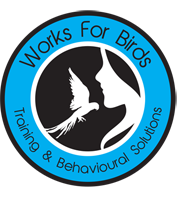What To Do If You Lose A Bird
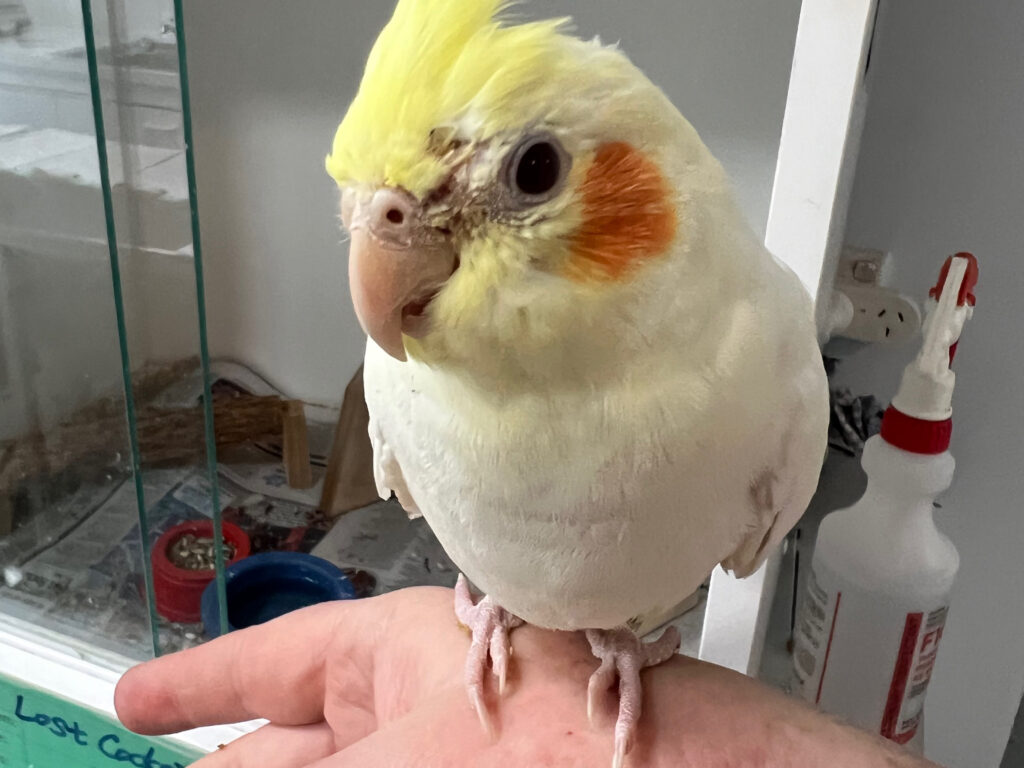
Which Way Is The Wind Blowing?
It's not the first thing that jumps into your head, but it needs to be. A scared, frightened, exhausted bird (particularly if they're inexperienced in flight), is going to take the easiest, fastest, way out of danger. Flying into the wind uses a lot more energy, than flying with the wind. Noticing which way the wind is blowing, is going to be a VERY useful tool when you want to know which way your bird is most likely travelling. You're going to want to get the word out as quickly as possible, but you're going to want to prioritise which areas you hit first. Wind is one of the most important factors in shaping your priorities.
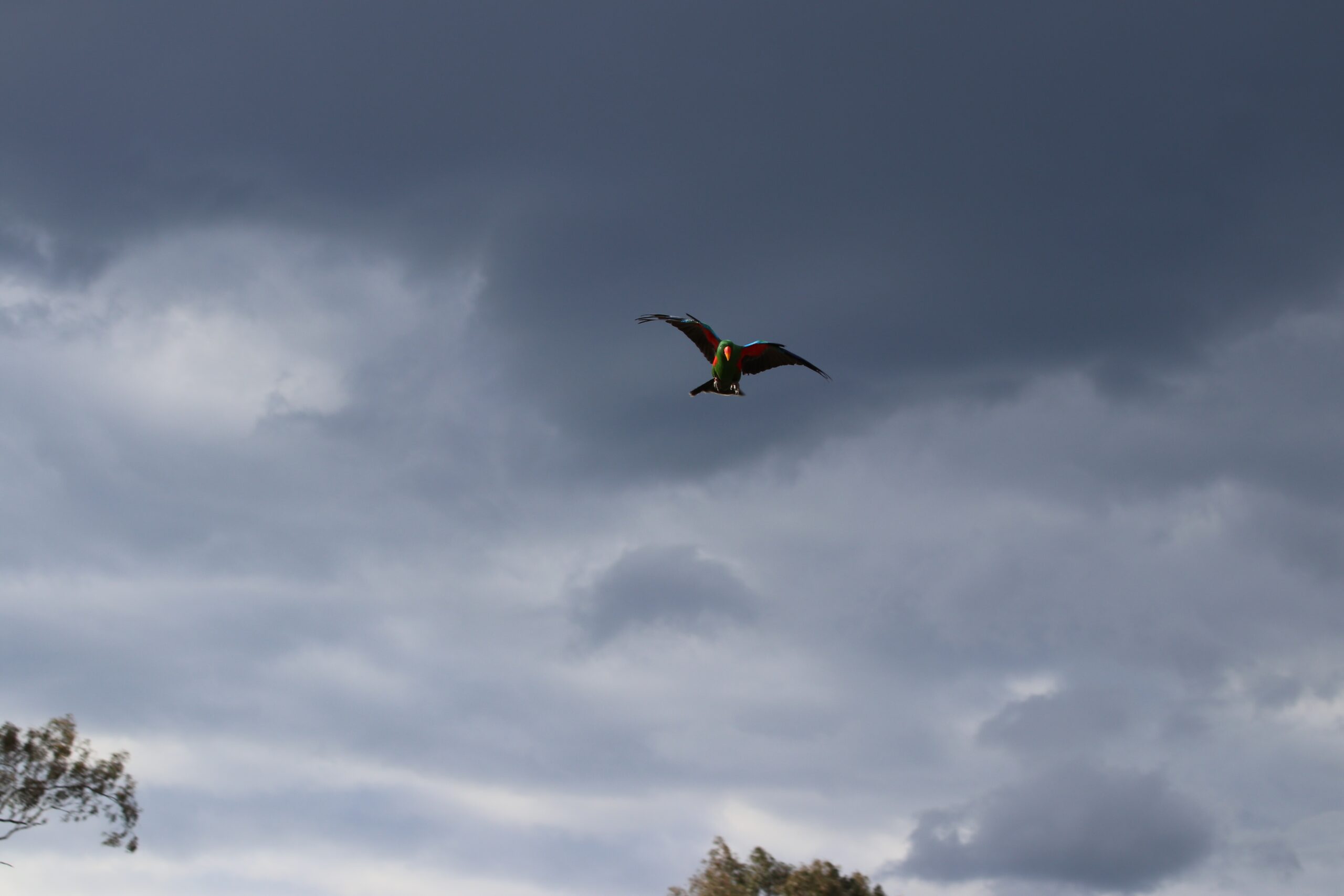
Use the Vocalisations of Wild Birds, Especially at Dawn and Dusk.
Wild birds (particularly in Australia) are extremely territorial. In Australia, you're not just worrying about the birds of prey. Ravens and magpies will happily attack a domestic parrot. Noisy Miner birds are incredibly aggressive and will take on a wedge tailed eagle without fear, so a timid pet is easy prey to them. Butcher birds? They're called that because they impale their victims and strip the meat off them. The list goes on... The chances of your bird finding help from wild birds is virtually non-existent. That said, they just might help YOU in your search. When they find a pet, they're vocal about it. Check out any disturbances that you hear, it could be your bird in trouble.
Why dawn and dusk? Birds are very vocal and active at this time - particularly if they have a nest. It pays to use this to chart where wild birds are nesting. They're going to be more territorial around a nest. Finding nests will tell you where your bird IS NOT likely to be. Your bird will have been chased away from a nest. If they happen to have stumbled into a nesting area, they could be the cause of the wild bird alarm calls/chase off noises that you're hearing. Check nesting areas out and prioritise search areas downwind from them.
Remember, the wild birds can see more than you can. If they're not worried and are vocalising normally, your bird either isn't there or isn't visible (hiding).
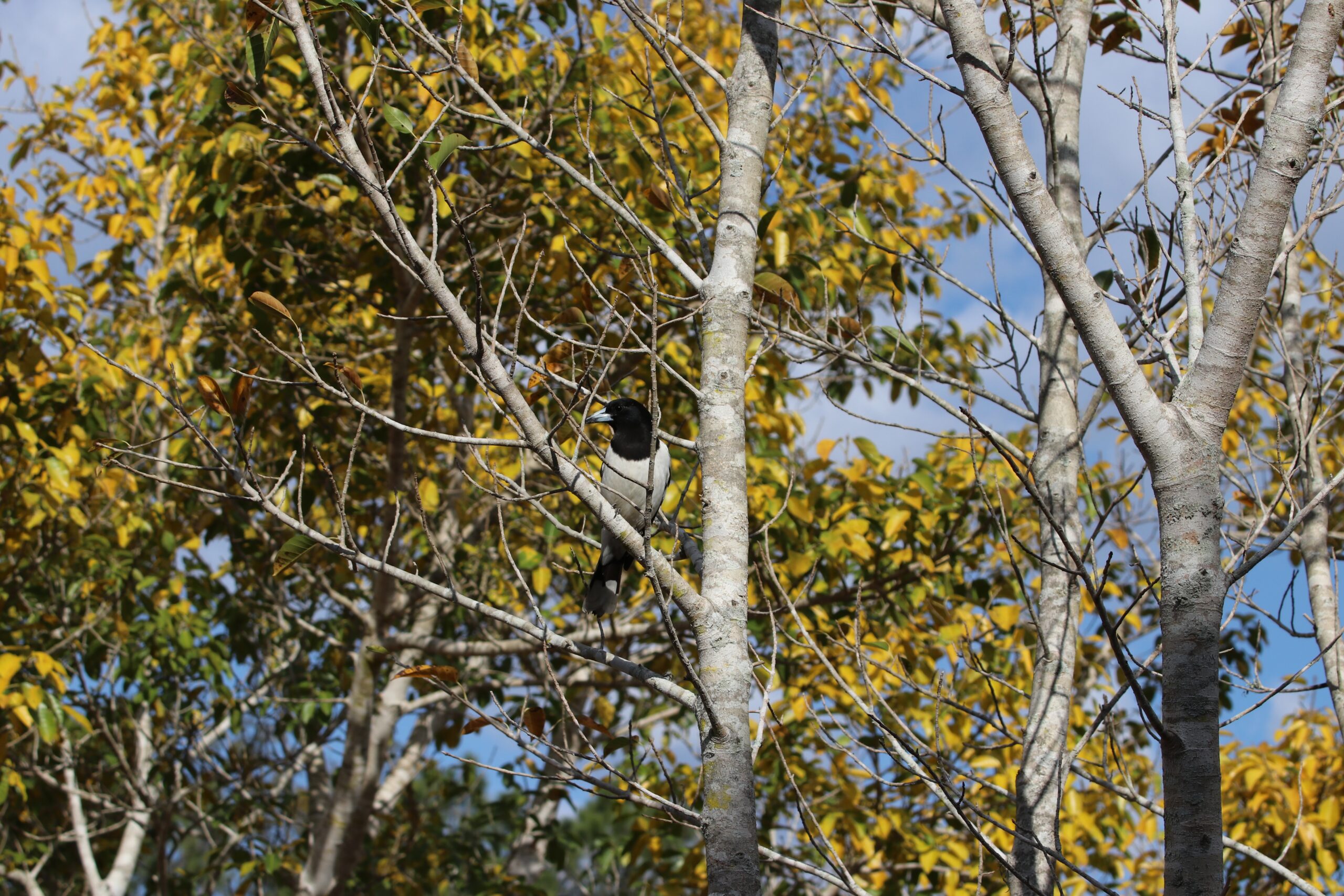
ADVERTISE Online and In Person.
Make your advertisements clear. Add some emotion. Mention that your bird is missed and loved. Include details of where your bird was lost, when your bird was lost and what your bird looks like. You know you have lost a quaker parrot and that they call quakers monk parakeets in other countries. The person who finds your bird is unlikely to have the same knowledge. They know your bird is a bird, has feathers and if you're lucky what colour it is. So while it is important to mention your bird's breed, you must also say what colour it is. You must have the words "lost", "bird", "parrot" and "colour" in any online advertisements for your adverts/posts to show up when someone types a keyword into a search engine.
DO NOT OVERSHARE. Keep identifying features to yourself. It's ok to say you will be able to identify your bird, but it's not ok to list your bird's vocabulary, say it has a leg ring (and what colour it is) or even to say if it is microchipped. This is the information that you will use to claim your bird. Unfortunately there are dishonest people who may fraudulently try to claim your bird. You do not want to make it easier for them.
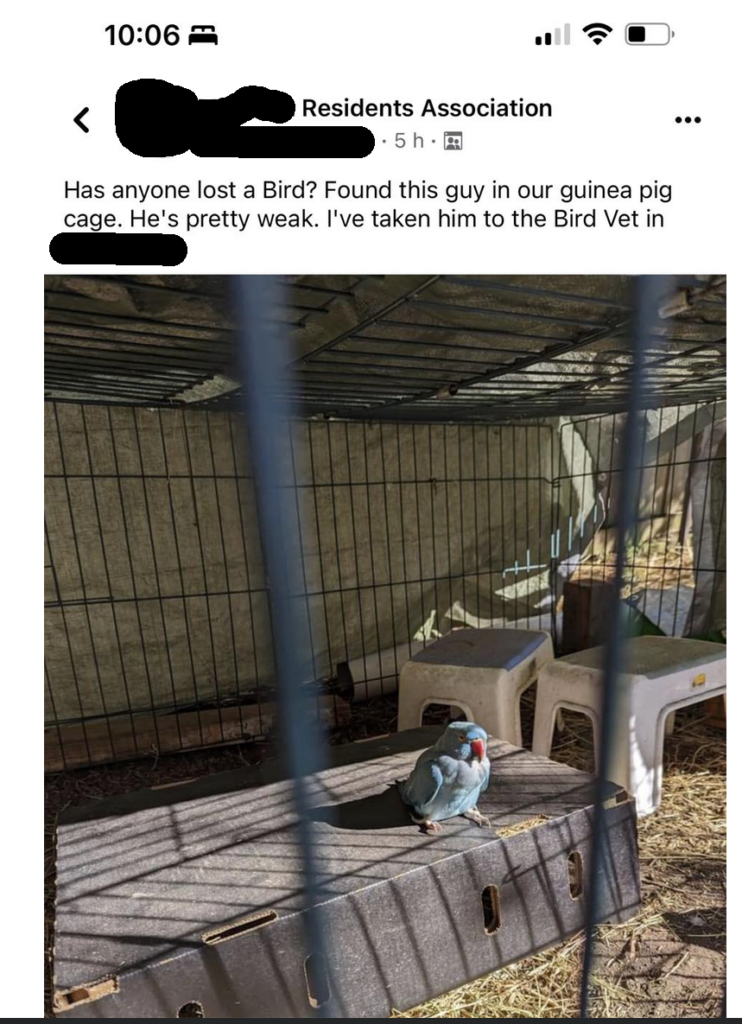
Online Advertisements - what you need to know
Apart from the obvious of trying to optimise your keywords in your advert (type of bird, colour, where and when your bird was lost). There are some things you should think of when advertising online.
Firstly the internet changes daily. So if you want to know where to advertise online, do a quick search on lost birds and see what ranks well. This will tell you which sites to advertise on.
On Facebook, there are groups devoted to lost birds and reuniting them - these are usually area based. It pays to advertise here but don't restrict advertising to bird or pet related sites. Community groups or local area noticeboards/pages are worth advertising on. Keep it basic as the people on those pages aren't familiar with birds.
Unfortunately, there are some unethical people that may contact you. Say they have your bird, demand a ransom. Send you pics of dead birds. All sorts of horrible things. Know you're not alone. Reach out to someone like site owners/organisers or even the police if this happens. Know that these people exist and that it's a common scam. It's incredibly unlikely that they have your bird.
Flyers/Leaflets/Posters - what you should know.
Letterbox drops are an amazing tool. There are some things you should think about. The obvious start is content. A clear picture that cuts off things like legbands so that no one can falsely claim your bird. The where, when, even how of what has happend. Something emotional like you miss your bird (so that people want to give your bird back). All important. Size of fonts and colour - make your advert stand out. Weatherproof any posters (laminators are your friend). That's all pretty obvious.
What isn't obvious is what happens when you get to the point where you are physically putting the leaflets into the letterbox. Most letterbox flaps are small and designed to stop things blowing away. You will most likely find yourself needing to fold your flyer to put it in. Psychologically, you're going to want to protect the bird you lost. You're unconsciously likely to fold the flyer so that your bird's picture and details are on the inside where they will stay clean and safe. Overrule your subconscious. Fold it so that the picture and lost heading are obvious on the outside. Most people will glance at junkmail and throw it out. If that glance doesn't show a lost animal in need, they may assume your flyer is an advert and not even look at it. Your bird needs you to think like a marketing expert.
Include a prompt at the bottom of your flyer asking people not to discard the flyer because they may see your bird in coming days.
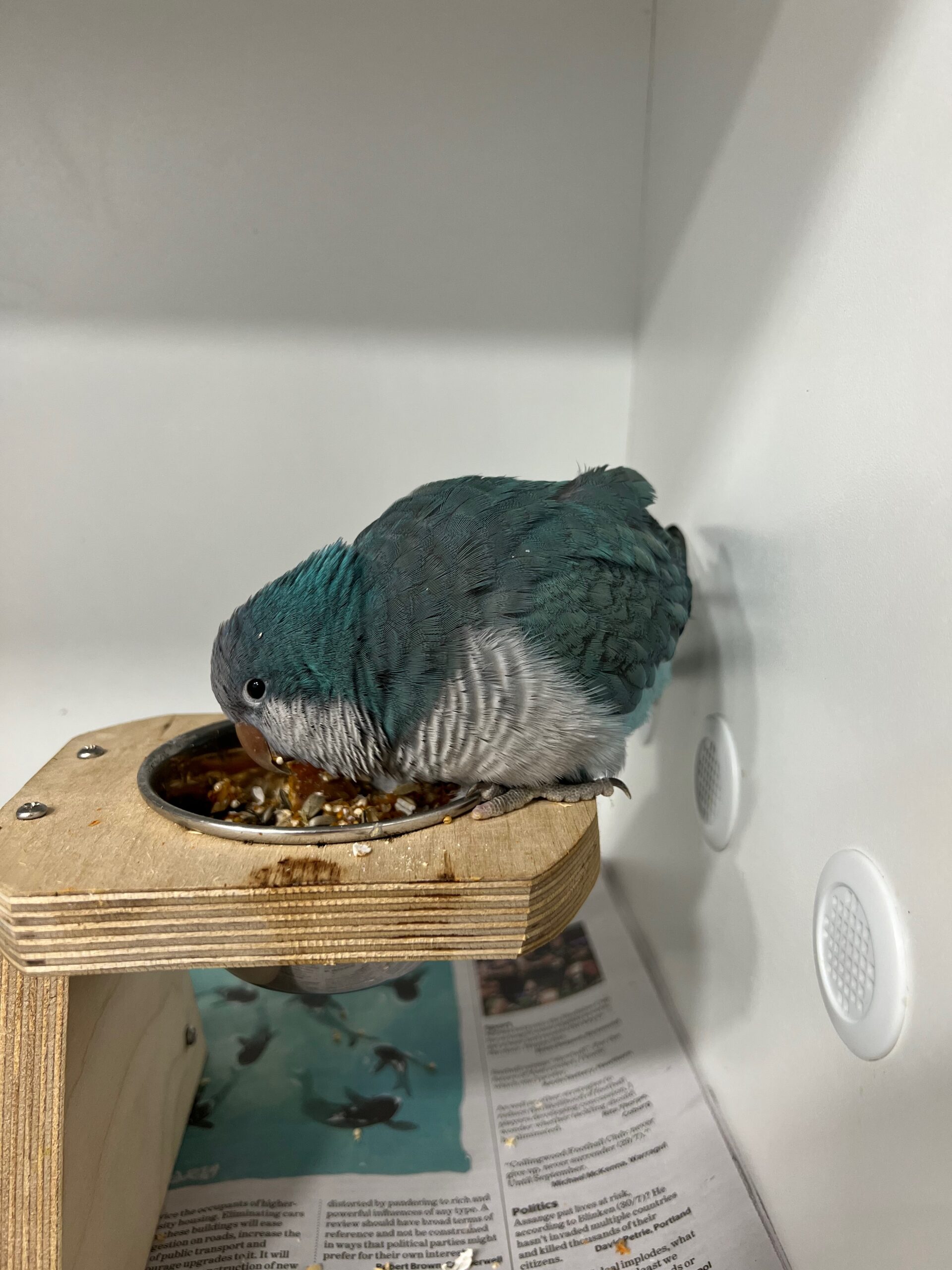
Contact Local Businesses
Make contact with all of your local veterinarians and the main bird vets in your state. Birds can get some distance, and a bird vet is a common destination for lost birds. Contact wildlife rescues, council pounds and other pet rescues. Contact local pet stores. Do not forget about other types of businesses. Look for businesses that have their doors open during the day (such as local cafes) as your bird may fly in looking for help. These are great places to ask to put up a poster.
Leave a Cage Out & Make Noise
Give your bird somewhere safe to return to. If possible encourage your other birds to make noise. Let them call your bird in. Remember sound carries. So if you haven't got other birds to call your bird in, make noise as you physically search. Play a recording if you have it.
Network
Contact others who have missing birds that might look like or be the same type as yours. Share leads. Look at it this way, your goal is to create as much publicity about your lost bird as possible. So is theirs. Combine your efforts and you're going to reach a LOT more people.
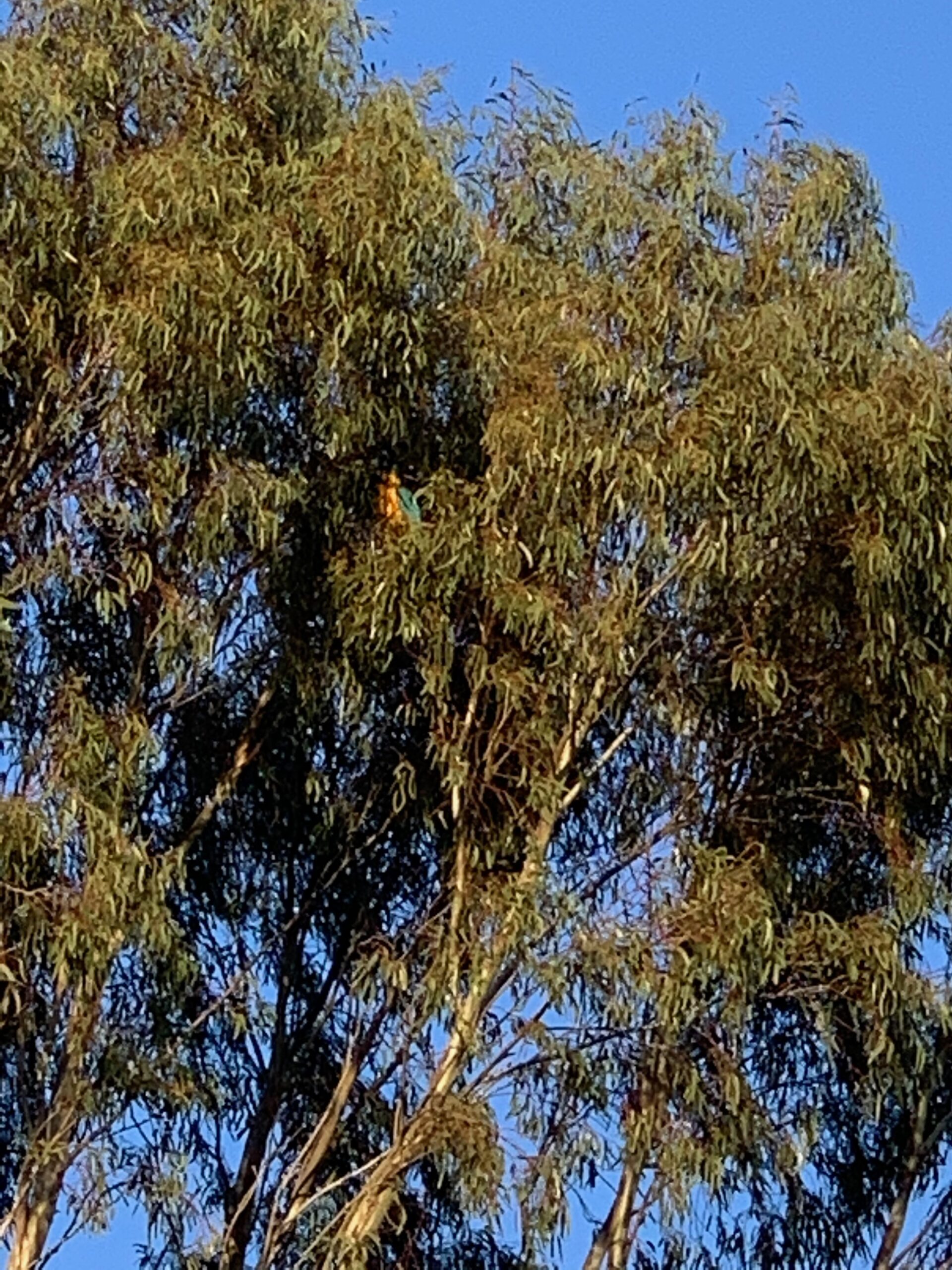
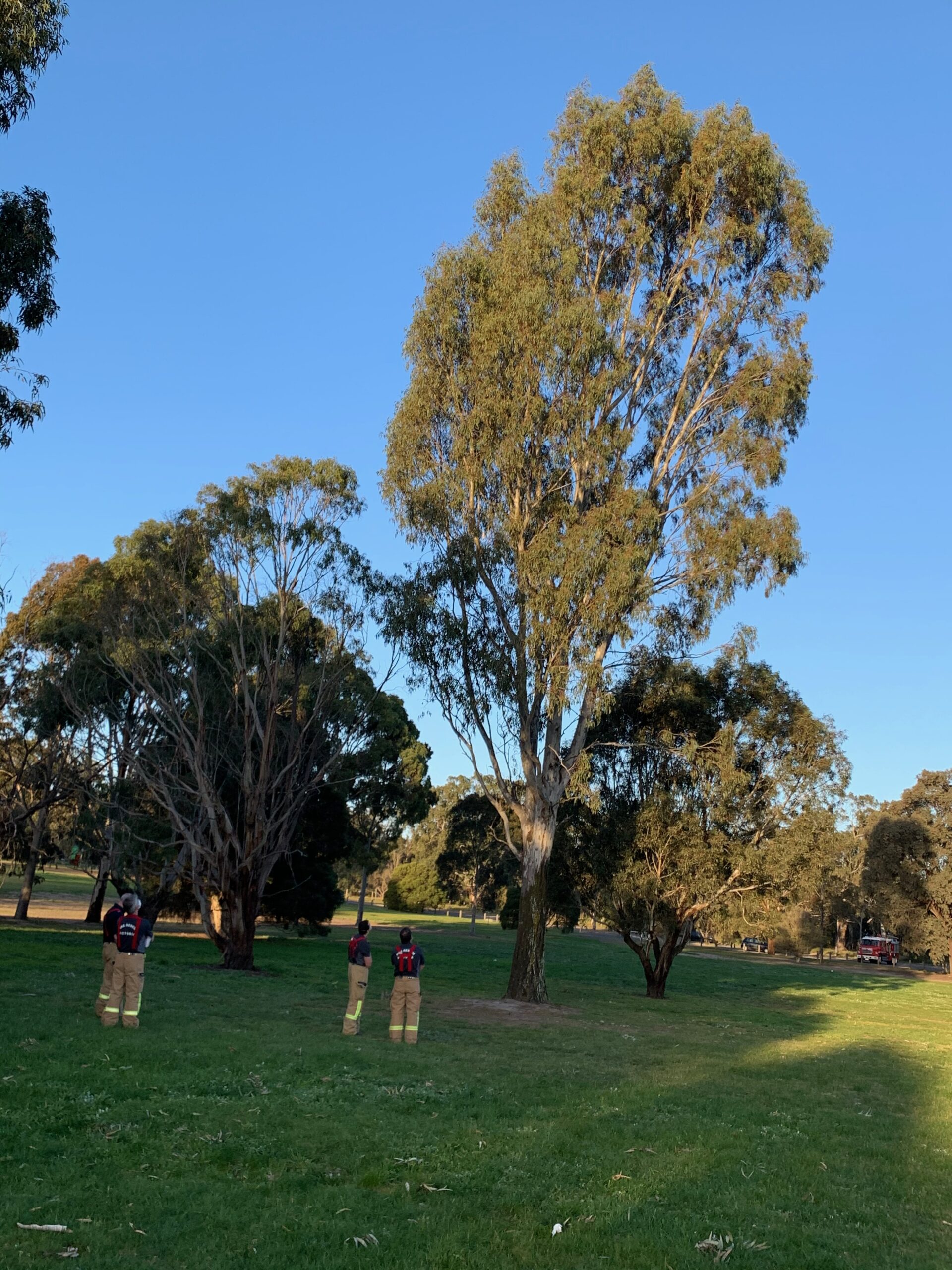
If You Find Your Bird and It Is Stuck Up A Tree...
Pet birds are often terrible flyers. They're easily waylaid by wind, can't outfly predators and surprisingly, afraid of heights. Descent is scary and difficult. Pet birds that are stuck up high trees often won't voluntarily fly down. You have a few options here. You can call in help. Companies with access to cherry pickers, such as the fire brigade, state emergency services, even the electrical company. Another option is an aborist. A quick post to a lost birds facebook group and people will quickly respond with names of who to call for help in your area.
Meanwhile, make it easier for your bird by reducing the angle that they have to fly to get to you. some quick ways to do this - stand back from the tree or building and call. The further back you are, the less the angle of descent is going to be. Another option is to get up high. Some owners have reported success from climbing on a neighbouring lower down roof or tree, even a cubby house and calling to their birds from there.
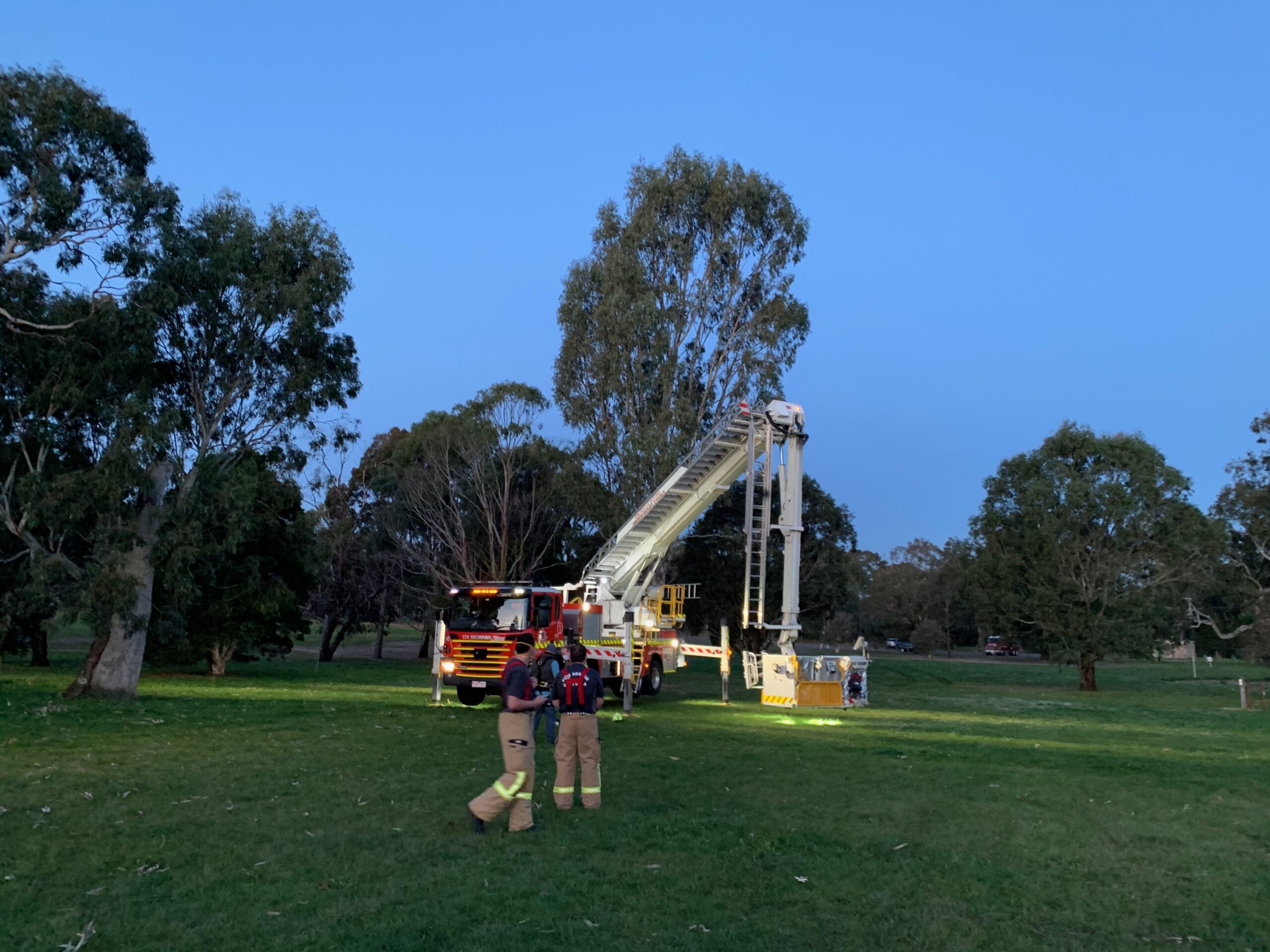
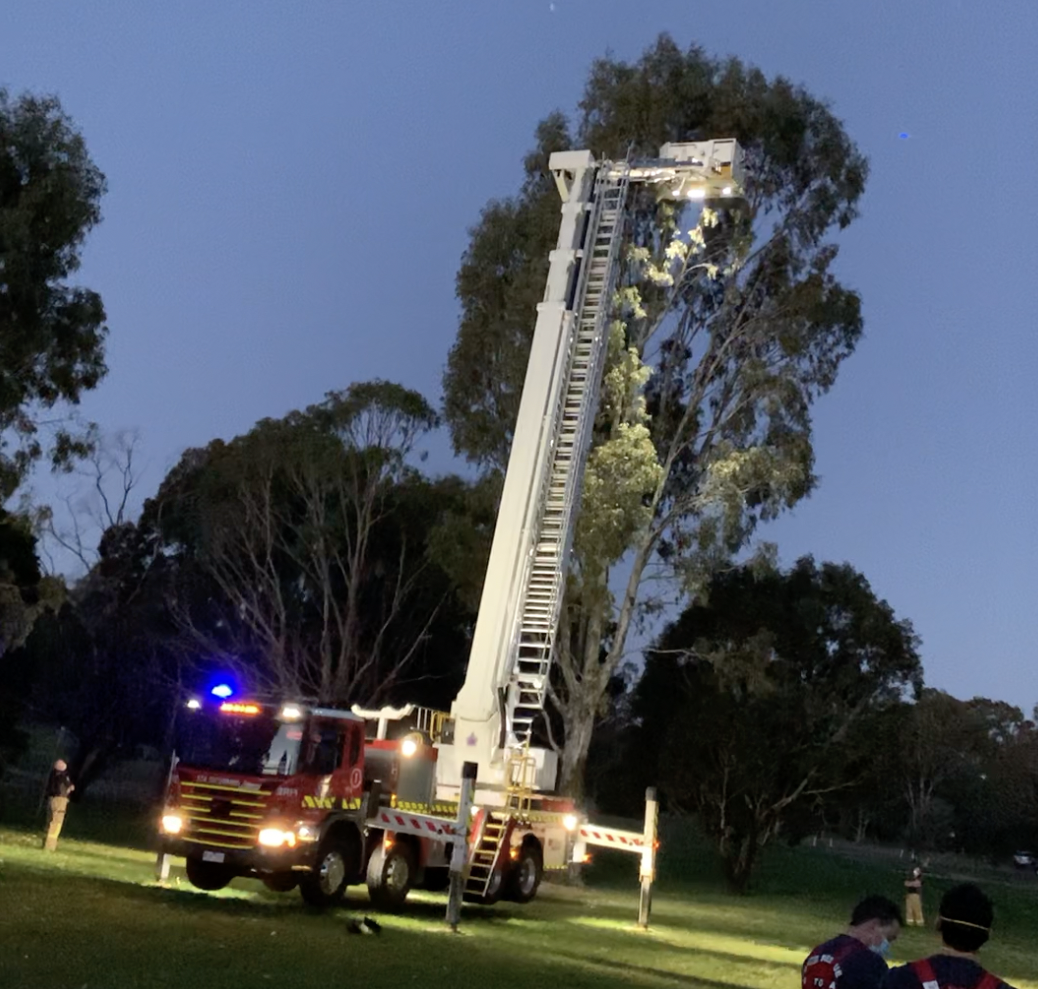
If You Get Your Bird Back
A vet visit is a must. Exhaustion, shock, lack of food, exposure to the elements are all life threatening to a bird. You will need to keep your bird warm and get it to a vet. Small meals at first. If you have a first aid formula such as polyaid or spark, add it to your bird's water.
Keep a close eye on your bird in the following weeks. The stress of escaping can trigger an illness and exposure to wild birds has all sorts of associated risks. From exposure to diseases such as beak and feather disease, to parasites.
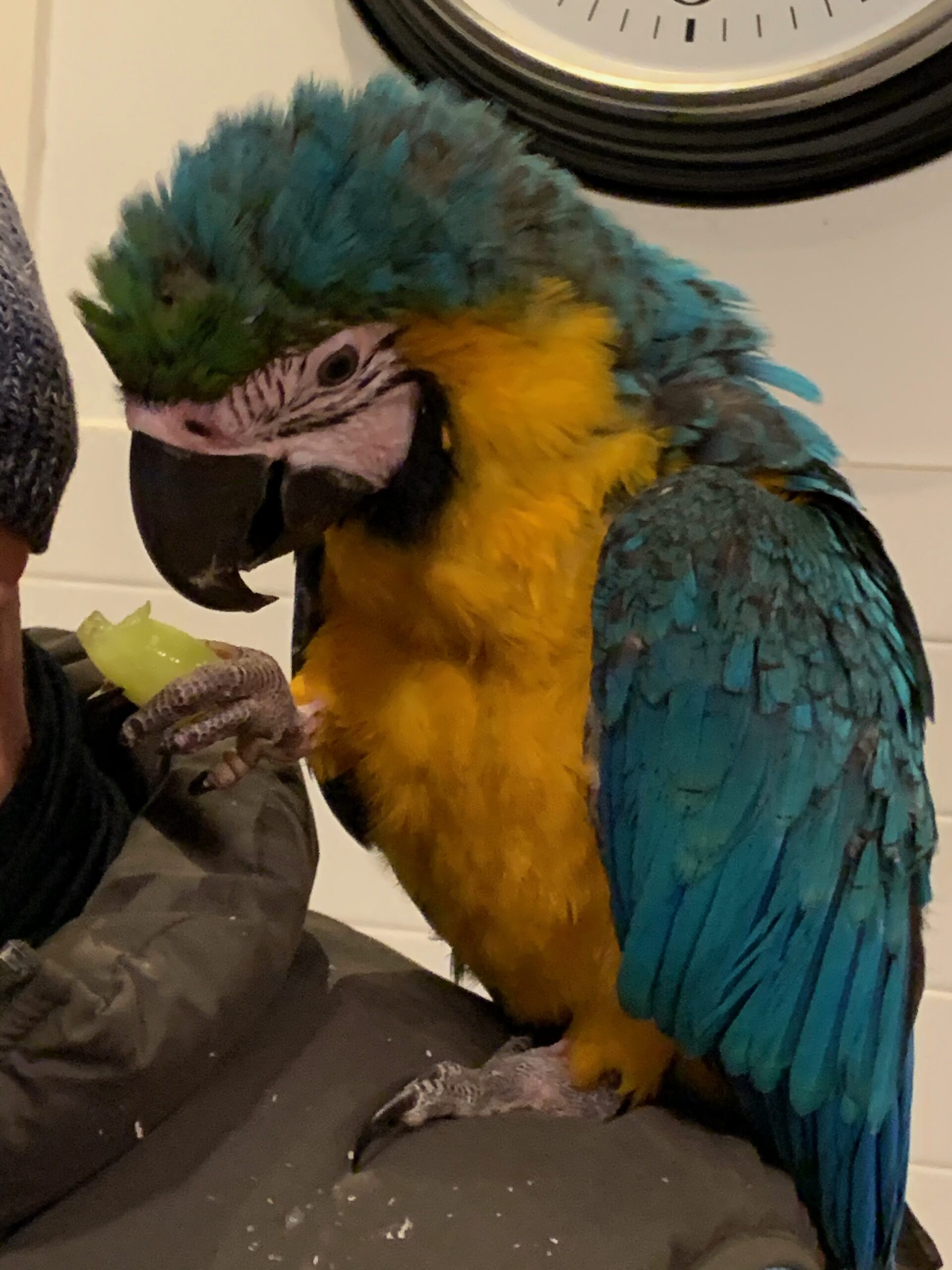
Should I Clip My Bird's Wings?
It saddens me how many birds get their wings clipped after escaping. A correctly clipped bird (and even a badly clipped one) should still be able to fly, particularly if caught in wind. A clipped bird is significantly more at risk when they escape. They can't get away from predators as easily.
Please microchip your birds and train them. It's a lot easier to get a bird back if you have taught it to recall to you or another human.
